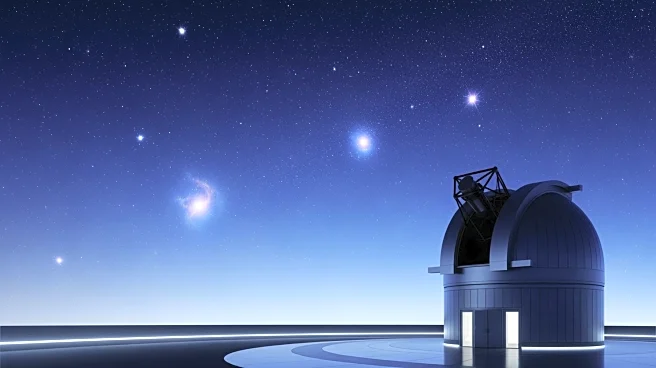What's Happening?
The Atacama Cosmology Telescope (ACT) has released its final data, confirming the Hubble tension—a discrepancy in the measurement of the Hubble constant, which indicates the rate of cosmic expansion. The ACT's observations, particularly its high-resolution
polarization maps of the cosmic microwave background (CMB), complement the data from the Planck satellite, reinforcing the inconsistency between measurements from distant cosmic epochs and those from nearby astronomical objects. This discrepancy challenges existing cosmological models and narrows theoretical options, as many extended models have been ruled out by ACT's findings. The ACT's data release marks a significant advancement in understanding the universe's evolution and provides a new starting point for cosmological research.
Why It's Important?
The confirmation of the Hubble tension by the ACT has profound implications for cosmology, as it suggests a fundamental issue with the current model used to describe the universe. This discrepancy could lead to a reevaluation of cosmological theories and models, impacting how scientists understand the universe's expansion and evolution. The ruling out of extended models simplifies the theoretical landscape, allowing researchers to focus on more viable paths forward. The ACT's data, being complementary to Planck's, enriches the composite picture of the universe, providing sharper images and more sensitive measurements that are crucial for future studies. This development could drive new research directions and innovations in cosmology.
What's Next?
With the ACT's final data release, the scientific community is encouraged to continue exploring and utilizing these findings to further investigate the universe's mysteries. Researchers may focus on developing new models or refining existing ones to resolve the Hubble tension. The ACT's data will serve as a valuable resource for ongoing and future cosmological studies, potentially leading to breakthroughs in understanding cosmic expansion and the universe's fundamental properties. Collaboration among scientists worldwide will be essential to interpret these results and explore new theoretical frameworks.
Beyond the Headlines
The implications of the ACT's findings extend beyond immediate scientific research, potentially influencing philosophical and cultural perspectives on the universe. The confirmation of the Hubble tension challenges long-held assumptions about cosmic expansion, prompting a reconsideration of humanity's place in the cosmos. This could inspire new dialogues in science and philosophy, as well as influence educational approaches to teaching cosmology. The narrowing of theoretical options may also lead to more focused funding and resource allocation in scientific research, impacting how institutions prioritize cosmological studies.














